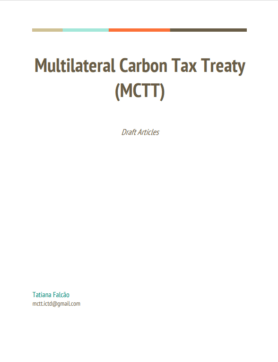These are the articles of the Multilateral Carbon Tax Treaty (MCTT), for discussion purposes. The MCTT comprises 31 articles that together establish an obligation on contracting states to tax carbon contained in fossil fuel ore or one of its by products, at the level of extraction. If the country entitled to tax at the level of extraction chooses not to exercise its right to tax, it allows first the country of refining or processing, and second, the country of consumption, under a secondary and tertiary allocation of rights. The MCTT identifies a minimum carbon tax, but not a ceiling. It provides for different tax rate schedules according to the country’s level of development and following the principle of common but differentiated responsibilities. This is an environmental agreement that uses a tax instrument (a carbon tax) to assist countries in meeting the mitigation objective contained in the nationally determined contributions, as set forth in the Paris Agreement. In other words, it is an environmental agreement that enables countries to use a tax instrument to quantify and reduce carbon dioxide emissions in furtherance of the climate commitments assumed under the Paris Agreement. Working Paper 187 was then written to highlight the key policy considerations undertaken when drafting the articles that informed the text of the Multilateral Carbon Tax Treaty (MCTT). It is the product of the many comments received from the commentators invited to provide inputs to the MCTT.
